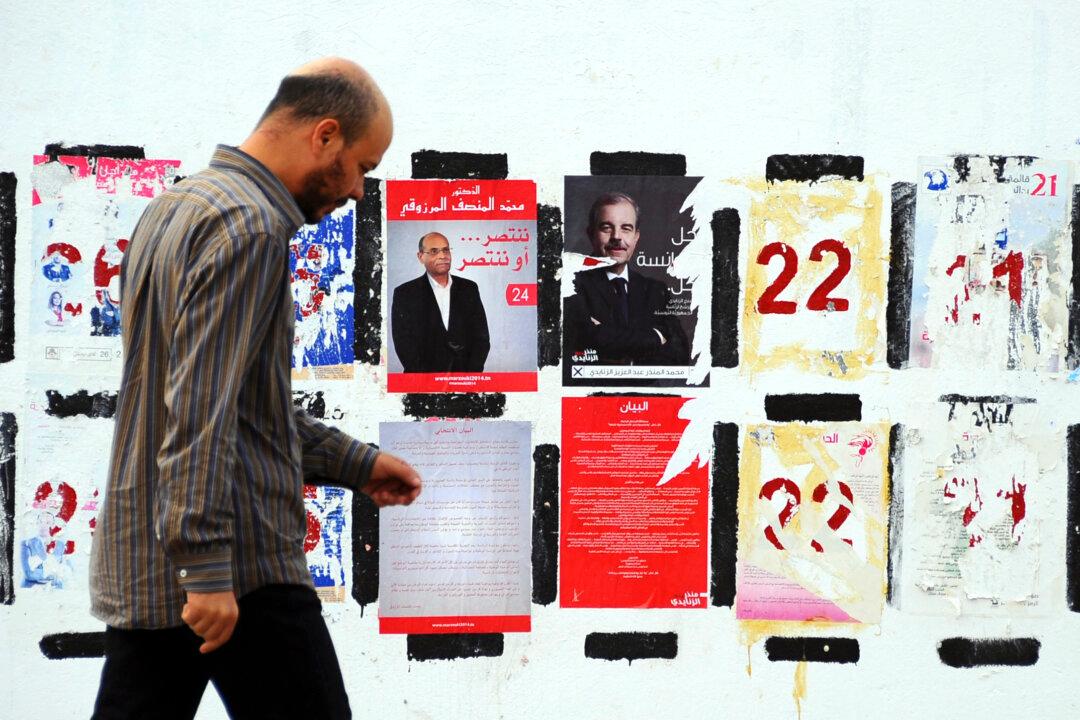TUNIS, Tunisia—Tunisians voted on Sunday for a new president in a runoff between an official from the country’s previous regimes and a veteran human rights activist who came to power after the 2011 revolution.
The runoff between the two candidates is the third election in the last two months and represents the final stage in the country’s democratic transition since the Arab Spring revolution that overthrew long-ruling President Zine El Abidine Ben Ali.
Alone among the countries that experienced pro-democracy uprisings, Tunisia’s transition has remained on track.
“It is important because we don’t know ahead of time who will win, unlike in the past,” said Hatem Dekali, an employee of the national airline, as he cast his vote in the Tunis suburb of Carthage.
[aolvideo src=“http://pshared.5min.com/Scripts/PlayerSeed.js?sid=1759&width=480&height=300&playList=518569394&responsive=false”]
Turnout appeared to be much smaller than in the past two elections, suggesting voter fatigue in a country with around 5.3 million registered voters. At 4 p.m., two hours before polls closed, election officials reported a turnout of just 47 percent. Turnout in the previous two contests was just under 70 percent of registered voters.
“This election doesn’t interest me,” said a young man sitting in a crowded cafe in front of a polling station in Tunis’ lower income neighborhood of Yasmina. “I voted before, but I feel the candidates lie. They promise to create jobs for the youth and improve living conditions, but they don’t keep them.”
The contest pits Beji Caid Essebsi, an 88-year-old minister in previous Tunisian governments, against Moncef Marzouki, a 69-year-old rights activist who became interim prime minister after the revolution.
Essebsi is a favorite to win after taking 39 percent of the vote in last month’s first round and he has promised to restore the “prestige of the state” after the chaotic first years following the revolution marked by unrest and economic problems.
“Essebsi, thanks to his political experience and international ties as well as his program, can get the country out of this mess,” said Mehrez Rakkez, a lawyer voting in the lower income neighborhood of Kram. He described Marzouk’s three years as interim president as a disaster and said the vote is a choice between “life and death.”
[caption id=“attachment_1155462” align=“alignnone” width=“480”] A Tunisian draped in the national flag arrives at a polling station to vote in La Marsa, outskirts of Tunis, Tunisia, Sunday, Dec. 21, 2014. Tunisians must decide Sunday between Beji Caid Essebsi, an 88-year-old veteran of previous regimes, and Moncef Marzouki, a 75-year-old human rights activist who is the outgoing interim president. For the third time in just two months, Tunisian voters will head to the polls this weekend, this time to elect a president in a runoff vote that presents a stark choice between the country’s past and its Arab Spring revolution. (AP Photo/Hassene Dridi)[/caption]
A Tunisian draped in the national flag arrives at a polling station to vote in La Marsa, outskirts of Tunis, Tunisia, Sunday, Dec. 21, 2014. Tunisians must decide Sunday between Beji Caid Essebsi, an 88-year-old veteran of previous regimes, and Moncef Marzouki, a 75-year-old human rights activist who is the outgoing interim president. For the third time in just two months, Tunisian voters will head to the polls this weekend, this time to elect a president in a runoff vote that presents a stark choice between the country’s past and its Arab Spring revolution. (AP Photo/Hassene Dridi)[/caption]Marzouki, who took 33 percent of the vote last month, has warned that Essebsi, whose party also won October’s parliamentary election, will bring back the authoritarian policies of the previous regimes.
“Freedom is my main demand of the next president, the rest will be up to the government and the people to get back to work,” said Bechir Farhat, a retired civil servant.
Tunisia’s moderate Islamists, who still have a great deal of backing in the country, aren’t officially backing either candidate, but are believed to lean toward Marzouki.
The eve of the election was marked by violence with a shotgun blast wounding a soldier near the city of Kairouan. The attackers returned early Sunday morning and attempted to target another polling station but were caught by the army which killed one and arrested three.
No other major acts of violence were reported by the time polls closed at 6 p.m.
Islamic radicals vowed further attacks on security forces in a video that surfaced on social networks Wednesday urging people to boycott the election.
According to authorities, around 100,000 police and soldiers secured the polls, and certain stations in the border regions with Algeria were closing close early because of security reasons.
With a rise in terrorist attacks after the revolution, security has been a major issue in the election campaign.
From The Associated Press


